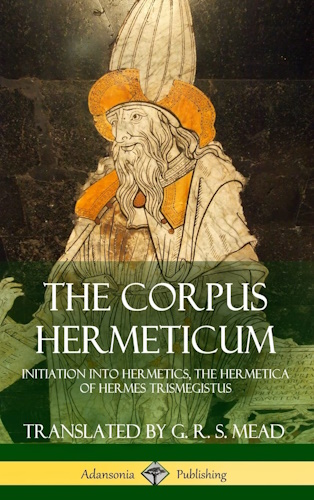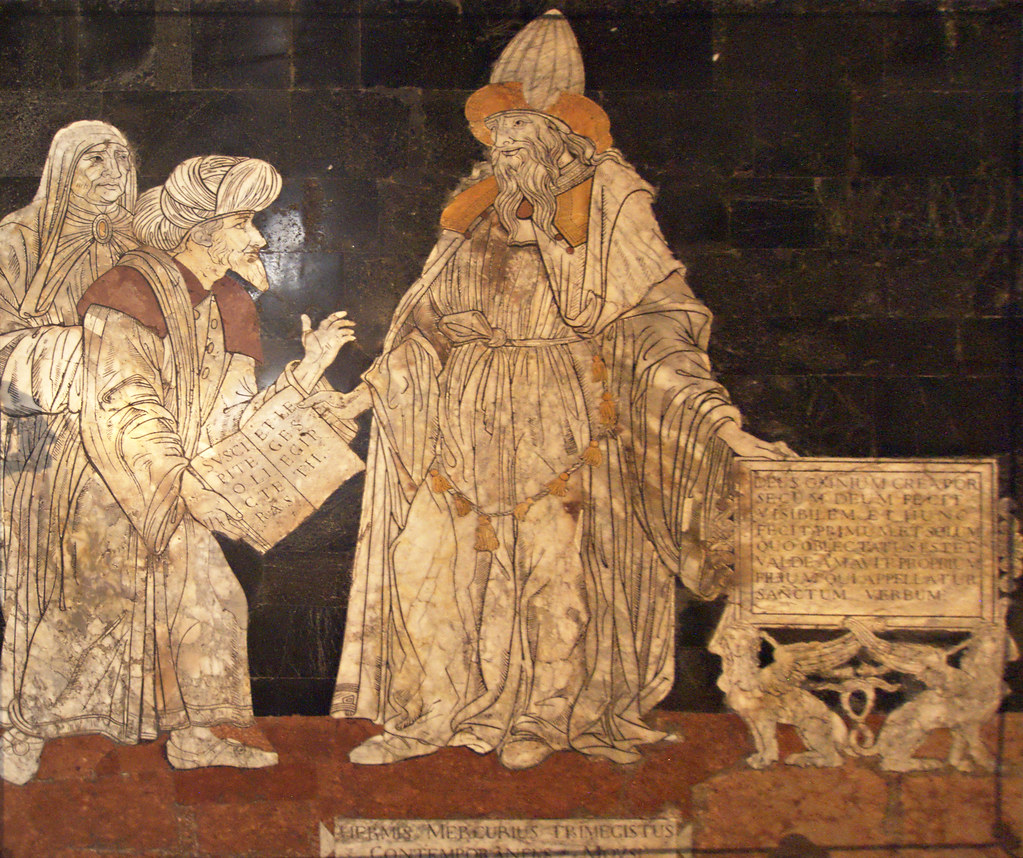
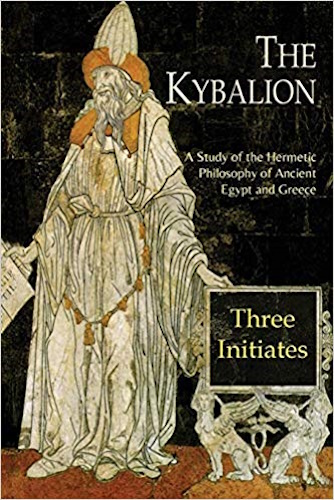

![Thrice-Greatest Hermes; Studies in Hellenistic Theosophy and Gnosis [Three Volumes in One] Thrice-Greatest Hermes; Studies in Hellenistic Theosophy and Gnosis [Three Volumes in One]](http://realityroars.com/images/affiliate-creative/thrice-greatest-hermes--studies-in-hellenistic-theosophy-and-gnosis.jpg)

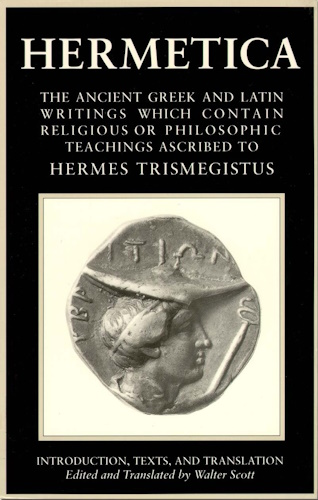



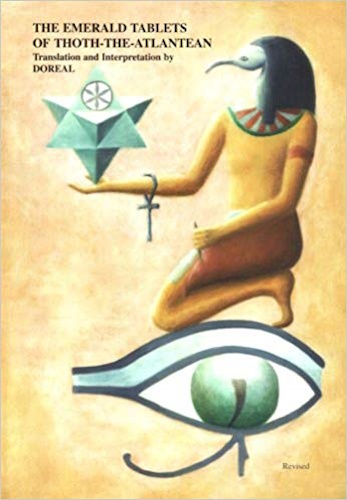

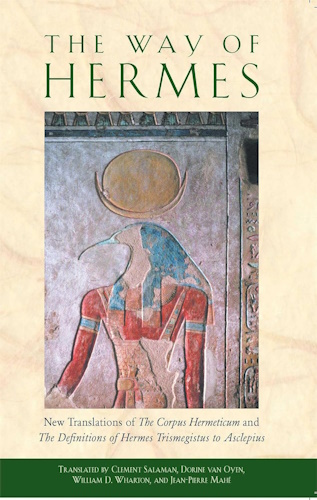

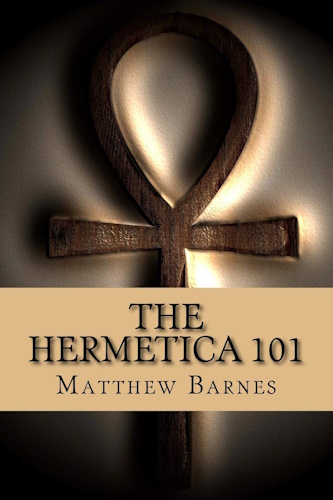

![]()
![]()
I. Poemandres, the Shepherd of Men
<This is the most famous of the Hermetic documents, a revelation account describing a vision of the creation of the universe and the nature and fate of humanity. Authors from the Renaissance onward have been struck by the way in which its creation myth seems partly inspired by Genesis, partly reacting against it. The Fall has here become the descent of the Primal Man through the spheres of the planets to the world of Nature, a descent caused not by disobedience but by love, and done with the blessing of God.
<The seven rulers of fate discussed in sections 9, 14 and 25 are the archons of the seven planets, which also appear in Plato's Timaeus and in a number of the ancient writings usually lumped together as "Gnostic". Their role here is an oddly ambivalent one, powers of Harmony who are nonetheless the sources of humanity's tendencies to evil. - JMG>
1. It chanced once on a time my mind was meditating on the things that are, my thought was raised to a great height, the senses of my body being held back - just as men who are weighed down with sleep after a fill of food, or from fatigue of body.
Methought a Being more than vast, in size beyond all bounds, called out my name and saith: What wouldst thou hear and see, and what hast thou in mind to learn and know?
2. And I do say: Who art thou?
He saith: I am Man-Shepherd (Poemandres), Mind of all-masterhood; I know what thou desirest and I'm with thee everywhere.
3. [And] I reply: I long to learn the things that are, and comprehend their nature, and know God. This is, I said, what I desire to hear.
He answered back to me: Hold in thy mind all thou wouldst know, and I will teach thee.
4. E'en with these words His aspect changed, and straightway, in the twinkling of an eye, all things were opened to me, and I see a Vision limitless, all things turned into Light - sweet, joyous [Light]. And I became transported as I gazed.
But in a little while Darkness came settling down on part [of it], awesome and gloomy, coiling in sinuous folds, so that methought it like unto a snake.
And then the Darkness changed into some sort of a Moist Nature, tossed about beyond all power of words, belching out smoke as from a fire, and groaning forth a wailing sound that beggars all description.
[And] after that an outcry inarticulate came forth from it, as though it were a Voice of Fire.
5. [Thereon] out of the Light [...] a Holy Word (Logos) descended on that Nature. And upwards to the height from the Moist Nature leaped forth pure Fire; light was it, swift and active too.
The Air, too, being light, followed after the Fire; from out of the Earth-and-Water rising up to Fire so that it seemed to hang therefrom.
But Earth-and-Water stayed so mingled with each other, that Earth from Water no one could discern. Yet were they moved to hear by reason of the Spirit-Word (Logos) pervading them.
6. Then saith to me Man-Shepherd: Didst understand this Vision what it means?
Nay; that shall I know, said I.
That Light, He said, am I, thy God, Mind, prior to Moist Nature which appeared from Darkness; the Light-Word (Logos) [that appeared] from Mind is Son of God.
What then? - say I.
Know that what sees in thee and hears is the Lord's Word (Logos); but Mind is Father-God. Not separate are they the one from other; just in their union [rather] is it Life consists.
Thanks be to Thee, I said.
So, understand the Light [He answered], and make friends with it.
7. And speaking thus He gazed for long into my eyes, so that I trembled at the look of him.
But when He raised His head, I see in Mind the Light, [but] now in Powers no man could number, and Cosmos grown beyond all bounds, and that the Fire was compassed round about by a most mighty Power, and [now] subdued had come unto a stand.
And when I saw these things I understood by reason of Man-Shepherd's Word (Logos).
8. But as I was in great astonishment, He saith to me again: Thou didst behold in Mind the Archetypal Form whose being is before beginning without end. Thus spake to me Man-Shepherd.
And I say: Whence then have Nature's elements their being?
To this He answer gives: From Will of God. [Nature] received the Word (Logos), and gazing upon the Cosmos Beautiful did copy it, making herself into a cosmos, by means of her own elements and by the births of souls.
9. And God-the-Mind, being male and female both, as Light and Life subsisting, brought forth another Mind to give things form, who, God as he was of Fire and Spirit, formed Seven Rulers who enclose the cosmos that the sense perceives. Men call their ruling Fate.
10. Straightway from out the downward elements God's Reason (Logos) leaped up to Nature's pure formation, and was at-oned with the Formative Mind; for it was co-essential with it. And Nature's downward elements were thus left reason-less, so as to be pure matter.
11. Then the Formative Mind ([at-oned] with Reason), he who surrounds the spheres and spins them with his whorl, set turning his formations, and let them turn from a beginning boundless unto an endless end. For that the circulation of these [spheres] begins where it doth end, as Mind doth will.
And from the downward elements Nature brought forth lives reason-less; for He did not extend the Reason (Logos) [to them]. The Air brought forth things winged; the Water things that swim, and Earth-and-Water one from another parted, as Mind willed. And from her bosom Earth produced what lives she had, four-footed things and reptiles, beasts wild and tame.
12. But All-Father Mind, being Life and Light, did bring forth Man co-equal to Himself, with whom He fell in love, as being His own child; for he was beautiful beyond compare, the Image of his Sire. In very truth, God fell in love with his own Form; and on him did bestow all of His own formations.
13. And when he gazed upon what the Enformer had created in the Father, [Man] too wished to enform; and [so] assent was given him by the Father.
Changing his state to the formative sphere, in that he was to have his whole authority, he gazed upon his Brother's creatures. They fell in love with him, and gave him each a share of his own ordering.
And after that he had well learned their essence and had become a sharer in their nature, he had a mind to break right through the Boundary of their spheres, and to subdue the might of that which pressed upon the Fire.
14. So he who hath the whole authority o'er [all] the mortals in the cosmos and o'er its lives irrational, bent his face downwards through the Harmony, breaking right through its strength, and showed to downward Nature God's fair form.
And when she saw that Form of beauty which can never satiate, and him who [now] possessed within himself each single energy of [all seven] Rulers as well as God's own Form, she smiled with love; for 'twas as though she'd seen the image of Man's fairest form upon her Water, his shadow on her Earth.
He in turn beholding the form like to himself, existing in her, in her Water, loved it and willed to live in it; and with the will came act, and [so] he vivified the form devoid of reason.
And Nature took the object of her love and wound herself completely around him, and they were intermingled, for they were lovers.
15. And this is why beyond all creatures on the earth man is twofold; mortal because of body, but because of the essential man immortal.
Though deathless and possessed of sway o'er all, yet doth he suffer as a mortal doth, subject to Fate.
Thus though above the Harmony, within the Harmony he hath become a slave. Though male-female, as from a Father male-female, and though he's sleepless from a sleepless [Sire], yet is he overcome [by sleep].
16. Thereon [I say: Teach on], O Mind of me, for I myself as well am amorous of the Word (Logos).
The Shepherd said: This is the mystery kept hid until this day.
Nature embraced by Man brought forth a wonder, oh so wonderful. For as he had the nature of the Concord of the Seven, who, as I said to thee, [were made] of Fire and Spirit - Nature delayed not, but immediately brought forth seven "men", in correspondence with the natures of the Seven, male-female and moving in the air.
Thereon [I said]: O Shepherd, ..., for now I'm filled with great desire and long to hear; do not run off.
The Shepherd said: Keep silence, for not as yet have I unrolled for thee the first discourse (logoi).
Lo! I am still, I said.
17. In such wise than, as I have said, the generation of these seven came to pass. Earth was as woman, her Water filled with longing; ripeness she took from Fire, spirit from Aether. Nature thus brought forth frames to suit the form of Man.
And Man from Light and Life changed into soul and mind - from Life to soul, from Light to mind.
And thus continued all the sense-world's parts until the period of their end and new beginnings.
18. Now listen to the rest of the discourse (Logos) which thou dost long to hear.
The period being ended, the bond that bound them all was loosened by God's Will. For all the animals being male-female, at the same time with Man were loosed apart; some became partly male, some in like fashion [partly] female. And straightway God spake by His Holy Word (Logos):
"Increase ye in increasing, and multiply in multitude, ye creatures and creations all; and man that hath Mind in him, let him learn to know that he himself is deathless, and that the cause of death is love, though Love is all."
19. When He said this, His Forethought did by means of Fate and Harmony effect their couplings and their generations founded. And so all things were multiplied according to their kind.
And he who thus hath learned to know himself, hath reached that Good which doth transcend abundance; but he who through a love that leads astray, expends his love upon his body - he stays in Darkness wandering, and suffering through his senses things of Death.
20. What is the so great fault, said I, the ignorant commit, that they should be deprived of deathlessness?
Thou seem'st, He said, O thou, not to have given heed to what thou heardest. Did I not bid thee think?
Yea do I think, and I remember, and therefore give Thee thanks.
If thou didst think [thereon], [said He], tell me: Why do they merit death who are in Death?
It is because the gloomy Darkness is the root and base of the material frame; from it came the Moist Nature; from this the body in the sense-world was composed; and from this [body] Death doth the Water drain.
21. Right was thy thought, O thou! But how doth "he who knows himself, go unto Him", as God's Word (Logos) hath declared?
And I reply: the Father of the universals doth consist of Light and Life, from Him Man was born.
Thou sayest well, [thus] speaking. Light and Life is Father-God, and from Him Man was born.
If then thou learnest that thou art thyself of Life and Light, and that thou [happen'st] to be out of them, thou shalt return again to Life. Thus did Man-Shepherd speak.
But tell me further, Mind of me, I cried, how shall I come to Life again...for God doth say: "The man who hath Mind in him, let him learn to know that he himself [is deathless]."
22. Have not all men then Mind?
Thou sayest well, O thou, thus speaking. I, Mind, myself am present with holy men and good, the pure and merciful, men who live piously.
[To such] my presence doth become an aid, and straightway they gain gnosis of all things, and win the Father's love by their pure lives, and give Him thanks, invoking on Him blessings, and chanting hymns, intent on Him with ardent love.
And ere they give up the body unto its proper death, they turn them with disgust from its sensations, from knowledge of what things they operate. Nay, it is I, the Mind, that will not let the operations which befall the body, work to their [natural] end. For being door-keeper I'll close up [all] the entrances, and cut the mental actions off which base and evil energies induce.
23. But to the Mind-less ones, the wicked and depraved, the envious and covetous, and those who mured do and love impiety, I am far off, yielding my place to the Avenging Daimon, who sharpening the fire, tormenteth him and addeth fire to fire upon him, and rusheth upon him through his senses, thus rendering him readier for transgressions of the law, so that he meets with greater torment; nor doth he ever cease to have desire for appetites inordinate, insatiately striving in the dark.
24. Well hast thou taught me all, as I desired, O Mind. And now, pray, tell me further of the nature of the Way Above as now it is [for me].
To this Man-Shepherd said: When the material body is to be dissolved, first thou surrenderest the body by itself unto the work of change, and thus the form thou hadst doth vanish, and thou surrenderest thy way of life, void of its energy, unto the Daimon. The body's senses next pass back into their sources, becoming separate, and resurrect as energies; and passion and desire withdraw unto that nature which is void of reason.
25. And thus it is that man doth speed his way thereafter upwards through the Harmony.
To the first zone he gives the Energy of Growth and Waning; unto the second [zone], Device of Evils [now] de-energized; unto the third, the Guile of the Desires de-energized; unto the fourth, his Domineering Arrogance, [also] de-energized; unto the fifth, unholy Daring and the Rashness of Audacity, de-energized; unto the sixth, Striving for Wealth by evil means, deprived of its aggrandizement; and to the seventh zone, Ensnaring Falsehood, de-energized.
26. And then, with all the energisings of the harmony stript from him, clothed in his proper Power, he cometh to that Nature which belongs unto the Eighth, and there with those-that-are hymneth the Father.
They who are there welcome his coming there with joy; and he, made like to them that sojourn there, doth further hear the Powers who are above the Nature that belongs unto the Eighth, singing their songs of praise to God in language of their own.
And then they, in a band, go to the Father home; of their own selves they make surrender of themselves to Powers, and [thus] becoming Powers they are in God. This the good end for those who have gained Gnosis - to be made one with God.
Why shouldst thou then delay? Must it not be, since thou hast all received, that thou shouldst to the worthy point the way, in order that through thee the race of mortal kind may by [thy] God be saved?
27. This when He'd said, Man-Shepherd mingled with the Powers.
But I, with thanks and belssings unto the Father of the universal [Powers], was freed, full of the power he had poured into me, and full of what He'd taught me of the nature of the All and of the loftiest Vision.
And I began to preach unto men the Beauty of Devotion and of Gnosis:
O ye people, earth-born folk, ye who have given yourselves to drunkenness and sleep and ignorance of God, be sober now, cease from your surfeit, cease to be glamoured by irrational sleep!
28. And when they heard, they came with one accord. Whereon I say:
Ye earth-born folk, why have ye given yourselves up to Death, while yet ye have the power of sharing Deathlessness? Repent, O ye, who walk with Error arm in arm and make of Ignorance the sharer of your board; get ye out from the light of Darkness, and take your part in Deathlessness, forsake Destruction!
29. And some of them with jests upon their lips departed [from me], abandoning themselves unto the Way of Death; others entreated to be taught, casting themselves before my feet.
But I made them arise, and I became a leader of the Race towards home, teaching the words (logoi), how and in what way they shall be saved. I sowed in them the words (logoi) of wisdom; of Deathless Water were they given to drink.
And when even was come and all sun's beams began to set, I bade them all give thanks to God. And when they had brought to an end the giving of their thanks, each man returned to his own resting place.
30. But I recorded in my heart Man-Shepherd's benefaction, and with my every hope fulfilled more than rejoiced. For body's sleep became the soul's awakening, and closing of the eyes - true vision, pregnant with Good my silence, and the utterance of my word (logos) begetting of good things.
All this befell me from my Mind, that is Man-Shepherd, Word (Logos) of all masterhood, by whom being God-inspired I came unto the Plain of Truth. Wherefore with all my soul and strength thanksgiving give I unto Father-God.
31. Holy art Thou, O God, the universals' Father.
Holy art Thou, O God, whose Will perfects itself by means of its own Powers.
Holy art Thou, O God, who willeth to be known and art known by Thine own.
Holy art Thou,who didst by Word (Logos) make to consist the things that are.
Holy art Thou, of whom All-nature hath been made an image.
Holy art Thou, whose Form Nature hath never made.
Holy art Thou, more powerful than all power.
Holy art Thou, transcending all pre-eminence.
Holy Thou art, Thou better than all praise.
Accept my reason's offerings pure, from soul and heart for aye stretched up to Thee, O Thou unutterable, unspeakable, Whose Name naught but the Silence can express.
32. Give ear to me who pray that I may ne'er of Gnosis fail, [Gnosis] which is our common being's nature; and fill me with Thy Power, and with this Grace [of Thine], that I may give the Light to those in ignorance of the Race, my Brethren, and Thy Sons.
For this cause I believe, and I bear witness; I go to Life and Light. Blessed art Thou, O Father. Thy Man would holy be as Thou art holy, e'en as Thou gave him Thy full authority [to be].


![Thrice-Greatest Hermes; Studies in Hellenistic Theosophy and Gnosis [Three Volumes in One] Thrice-Greatest Hermes; Studies in Hellenistic Theosophy and Gnosis [Three Volumes in One]](http://realityroars.com/images/affiliate-creative/thrice-greatest-hermes--studies-in-hellenistic-theosophy-and-gnosis.jpg)











-
Urantia Book, 44:0.11 - The Celestial Artisans
Never in your long ascendancy will you lose the power to recognize your associates of former existences. Always, as you ascend inward in the scale of life, will you retain the ability to recognize and fraternize with the fellow beings of your previous and lower levels of experience. Each new translation or resurrection will add one more group of spirit beings to your vision range without in the least depriving you of the ability to recognize your friends and fellows of former estates.
-
Princess Bride 1987 Wallace Shawn (Vizzini) and Mandy Patinkin (Inigo Montoya)
Vizzini: HE DIDN'T FALL? INCONCEIVABLE.
Inigo Montoya: You keep using that word. I do not think it means what you think it means. -
Urantia Book, 117:4.14 - The Finite God
And here is mystery: The more closely man approaches God through love, the greater the reality -- actuality -- of that man. The more man withdraws from God, the more nearly he approaches nonreality -- cessation of existence. When man consecrates his will to the doing of the Father's will, when man gives God all that he has, then does God make that man more than he is.
-
Urantia Book, 167:7.4 - The Talk About Angels
"And do you not remember that I said to you once before that, if you had your spiritual eyes anointed, you would then see the heavens opened and behold the angels of God ascending and descending? It is by the ministry of the angels that one world may be kept in touch with other worlds, for have I not repeatedly told you that I have other sheep not of this fold?"
-
Urantia Book, Foreword - 0:12.12 - The Trinities
But we know that there dwells within the human mind a fragment of God, and that there sojourns with the human soul the Spirit of Truth; and we further know that these spirit forces conspire to enable material man to grasp the reality of spiritual values and to comprehend the philosophy of universe meanings. But even more certainly we know that these spirits of the Divine Presence are able to assist man in the spiritual appropriation of all truth contributory to the enhancement of the ever-progressing reality of personal religious experience—God-consciousness.
-
Urantia Book, 1:4.3 - The Mystery Of God
When you are through down here, when your course has been run in temporary form on earth, when your trial trip in the flesh is finished, when the dust that composes the mortal tabernacle "returns to the earth whence it came"; then, it is revealed, the indwelling "Spirit shall return to God who gave it." There sojourns within each moral being of this planet a fragment of God, a part and parcel of divinity. It is not yet yours by right of possession, but it is designedly intended to be one with you if you survive the mortal existence.
-
Urantia Book, 1:4.1 - The Mystery Of God
And the greatest of all the unfathomable mysteries of God is the phenomenon of the divine indwelling of mortal minds. The manner in which the Universal Father sojourns with the creatures of time is the most profound of all universe mysteries; the divine presence in the mind of man is the mystery of mysteries.
-
Urantia Book, 1:4.6 - The Mystery Of God
To every spirit being and to every mortal creature in every sphere and on every world of the universe of universes, the Universal Father reveals all of his gracious and divine self that can be discerned or comprehended by such spirit beings and by such mortal creatures. God is no respecter of persons, either spiritual or material. The divine presence which any child of the universe enjoys at any given moment is limited only by the capacity of such a creature to receive and to discern the spirit actualities of the supermaterial world.
-
Urantia Book, 11:0.1 - The Eternal Isle Of Paradise
Paradise is the eternal center of the universe of universes and the abiding place of the Universal Father, the Eternal Son, the Infinite Spirit, and their divine co-ordinates and associates. This central Isle is the most gigantic organized body of cosmic reality in all the master universe. Paradise is a material sphere as well as a spiritual abode. All of the intelligent creation of the Universal Father is domiciled on material abodes; hence must the absolute controlling center also be material, literal. And again it should be reiterated that spirit things and spiritual beings are real.
-
Urantia Book, 50:6.4 - Planetary Culture
Culture presupposes quality of mind; culture cannot be enhanced unless mind is elevated. Superior intellect will seek a noble culture and find some way to attain such a goal. Inferior minds will spurn the highest culture even when presented to them ready-made.
-
Urantia Book, 54:1.6 - True And False Liberty
True liberty is the associate of genuine self-respect; false liberty is the consort of self-admiration. True liberty is the fruit of self-control; false liberty, the assumption of self-assertion. Self-control leads to altruistic service; self-admiration tends towards the exploitation of others for the selfish aggrandizement of such a mistaken individual as is willing to sacrifice righteous attainment for the sake of possessing unjust power over his fellow beings.
-
Urantia Book, 54:1.9 - True And False Liberty
How dare the self-willed creature encroach upon the rights of his fellows in the name of personal liberty when the Supreme Rulers of the universe stand back in merciful respect for these prerogatives of will and potentials of personality! No being, in the exercise of his supposed personal liberty, has a right to deprive any other being of those privileges of existence conferred by the Creators and duly respected by all their loyal associates, subordinates, and subjects.
-
Urantia Book, 54:1.8 - True And False Liberty
There is no error greater than that species of self-deception which leads intelligent beings to crave the exercise of power over other beings for the purpose of depriving these persons of their natural liberties. The golden rule of human fairness cries out against all such fraud, unfairness, selfishness, and unrighteousness.

